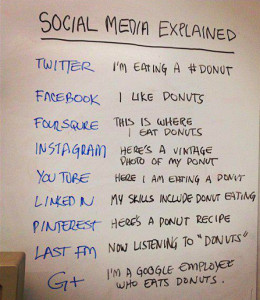Publicity?
I think it’s fair to say that you think that the work you do is important, interesting, and that others around you would do well to know about and support it.
That being the case, the question then is, how can you best let people know that:
a) the work you do is going on,
b) the work you do is important,
c) the work you do should be supported
I and I’m sure many others in the scientific community are reticent about publicity and self-promotion – shouldn’t the quality of our work speak for itself? Yes, it should. And in the long run, it will. If it’s good, important, useful work, your papers will be cited, and you will in time be recognised for your contributions to the scientific community.
There’s No Harm In Raising Awareness
That said, is there any harm in trying to raise awareness of the issues that you are working on, to try to speed up the process of solving the important problems that you want to solve, and making the important changes that you want to make?
One of the ways that you can help elevate the profile of your work is by an engaging with the ideas of publicity and public relations. This post is a few ideas that you might want to try to help increase the profile and recognition of your work and the work of your field, hopefully without any feelings of scientific charlatanism.
You Don’t Have to Blow Your Own Trumpet
How willing you are to blow your own trumpet is entirely down to you. I’m not really talking about you telling everyone you can find about how marvellous your work is. What I’m talking about is an awareness when it comes to raising interest in and about your local research environment.
My research, for example, involves using strain to control the magnetisation of magnetic materials, which may offer a route to low-power, next-generation computer devices.
Without really touching my work directly, or trying to explicitly promote my work, I can talk about, and publicise:
- the interest and importance of the problems we are trying to solve (energy consumption in computers)
- the general area of interest (spintronics, in this case)
- the general interest in the class of materials (magnetic materials that respond particularly well to strain)
- the benefits of the techniques – why is using strain a sensible thing to do?
It’s possible to talk about all those things in general terms, without feeling like I’m trying over-sell and flog my own research.
Think of It as Supporting Your Field, Not Yourself
If I stopped working the materials would still be interesting, the techniques would still be beneficial, and the problems would still be important. How good or terrible my work is doesn’t actually matter, and if I don’t want to, I don’t need to tell people about it specifically. Of course there are times when we do want to talk about our own work – but it’s not always essential.
We don’t have to talk about specifics, we can talk in generalities. Anything positive or interesting we say on those points above will hopefully benefit not just me but anyone else who works in a similar field to me. We all benefit from the positive publicity.
Start With Excellent Research
As the old saying goes “you can’t polish a turd” [actually, it turns out you can. But you know what I mean…] so the our primary focus has to be excellent research. Without research and papers that the community wants to know about, there isn’t a great deal that publicity can do for you. In fact, finding a key finding or result can cause a big enough splash on its own, without you having to raise much awareness about it yourself. The importance of focussing on research output is made very clear in A PhD is Not Enough!, and that until you have won your first grant or fellowship, your main aim must be to built up a solid, independent research record.
We can’t all be working in a head-line grabbing area of science, or routinely publish in high-impact factor journals, but we can make some steps to making sure our research is made available to people who want to know about it.
Research Group Website
Once you’re confident that you’re research platform is solid, I think an excellent place to start broadcasting your work more widely is with a website for your research group. This can apply whether you’re running your own lab or research group, or you are working within someone else’s.
If you’re lucky there will already be one set up, and you can simply work with that. If there isn’t one, your university probably has some provision or help for setting one up, and I recommend you looking into what they do offer.
An Opportunity To Let People Know About Your Work
You can think about your website as somewhere you can make regular ‘press releases’ about updates and news about your group. These press-release style posts aren’t intended to be picked up by science journalists looking for a scoop (although who knows – they might be), rather they are for people who are searching for information about things like you, your research, the research of the group, or just general information about the subject area you happen to work in.
Things you might want to mention in these posts include:
- Publication announcements – every time your group publishes a paper you can make a short note to say what the work was, why it was important and how it fits into your wider research programme.
- Equipment purchases – ok, it’s a bit of a dry subject, but someone browsing your website could well be intriqued to see that you have recently acquired a certein bit of kit, and be keen to collaborate with you in order to use it.
- Grant awards – again, it is possible to do this without blowing your own trumpet. You don’t necessarily need to say how much was awarded, or the exact details of the planned work, but the awarding of a grant does let people know that you and your group are ‘open for business’
- New staff/students – Celebrate the success of your group by mentioning when you take on new staff or students.
- Conference visits/group outings – this is an opportunity to showcase they ‘personality’ of your group. Would-be post-docs and PhD students can look at your website and see that yours is a friendly group to work in, with plenty of
Each of these is an excuse to say something positive about your group and what you do. The chances are people will only find this information if they are looking for it. If they are looking for it then you are doing them a service by putting it there for them.
Visit Other Research Group Websites For Insipiration
To get more ideas for the kind of content you might want to put on your group website you’ll probably be able to find some good examples from your own research community. A couple of examples from my field of spintronics are the Akerman Group – you can immediately see what the group does, and what it’s been getting up to lately; and the Awschalom Group – this is an example of a more university-branded website, but you can still quickly find out what their key research interests are.
One really important thing to do is to remember to update your website, at least once every few months or so. The internet is so full of absolute shockers of group websites that I won’t try to cause trouble by pointing out any of them here. Things to look out for that you don’t want on your website include:
- Out of date content – e.g. “Dr. Goodatscience joined our lab for a 2 year post doc in 1998″…
- Unprofessional appearance – these days it’s so easy to make a half-decent looking website, that there’s little excuse for not having one for your group. Talk to your institution to see what support they can give you.
University Press Office
You might not realise it, but your university has a press office. There job is to make the university look good and make sure the media hears about the work that the university is doing. Exactly how they will be able to help you will vary from institution to instituion, so it’s probably best to get in touch with them to see what they offer.
One thing they’re likely to be keen on is any papers you have published in high-impact factor journals such as Science, and Nature. Any particularly quirky results you have will probably go down well too. To get an idea for what they do you can visit they’re website. The University of Nottingham for example has a list of all press releases put out by the press office. If some of your work fits in with their themes, it may be worth you approaching them.
Social Media
These days twitter and other social media are a common and popular means of communication. You could, as some scientists do, have your own personal account which you use to fully engage with social media.
Alternatively you might find it more appealing to have an account for your research group – this could be automatically linked to your website to help disseminate the news and ‘press releases’ on your group website.
Printed Articles
Despite the rise of social media, there is still a potential role for more traditional media. Of course, the publicaitons that scientists will be mainly be reading are journals – and if you’ve already got a solid research base, then you should be publishing regularly in journals anyway. By looking a bit further afield from the journal publications, there are alternative options for having writing published that supports your work.
Use Trade and Subject Organisations
The main alternative to the research journals is trade magazines and organisations. For research this is likely to be something like the Institute of Physics, the Royal Society of Chemistry, or similar. There are also of course trade magazines and organisations for just about all types of scientific equipment and techniques e.g. vacuum coating, or microwave technology. If you flick through the magazines and websites of these organisations you’ll see that they very frequently have articles written by those working at the coal face of their particular industries. There may be opportunities for you to write an article or two highlighting the importance and significance of your area of work.
The Decision Is Yours
Publicity and publicising of work isn’t everyone’s cup of tea, and not all of the suggestions above will be palatable to everyone. My point is that these opportunites for supporting and raising awareness of your research area are out there, and you don’t need to sell out to make use of them.




